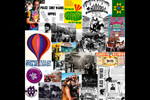Please Plant This Book
Richard Brautigan hovered around the Diggers like a butterfly that a
reader might expect to see flutter out of one of his novels that would
soon propel his name into the pantheon of famous-before-their-time writers and artists who streak across the horizon of our times.
Richard was attracted to the Communication Company as a true example of
what Marshall McLuhan described as "medium is the message". The
instant news service, sometimes publishing "new sheets" every
hour, provided a perfect outlet for Richard's prolific poetry. "All
Watched Over By Machines of Loving Grace", "Karma Repair
Kit", "Flowers For Those You Love", "The Beautiful
Poem", "Love Poem" — these are what Richard left for
lovers and dreamers of the Com/Co message.
Even though Richard was intimately involved in the Digger experience,
he was both a Digger and not at the same time. For example, Richard signed all his
Free work, which
contradicted the idea of anonymity that the Diggers had popularized
through their articles and Digger sheets that were never signed, except
with infamous names like "George Metesky" and
"Zapata". When Sam and I visited him in 1972 to ask for his help in collecting an archive of
Communication Company sheets, it seemed that he was disdainful of two dirty
communards blocking his view of the street from his favorite table at
Enrico's coffee house in North Beach. By then, his fame was secure. He didn't need the Diggers anymore.
But that was five years after Richard had been for a short while a part of the
Digger family. There are photos of Richard
delivering Free Food in the home delivery runs. There is a scene of
Richard in the Digger film "Nowsreal" planting seeds from his
Free book, Please Plant This Book, reading the poem called
"California Native Flowers". A poignant scene, to realize that
the seeds he is planting in the late spring of 1968 are the seeds of his
involvement with the Diggers. These adventures flowered well, but Richard
is about to move into a different phase of his all too-short life.
|
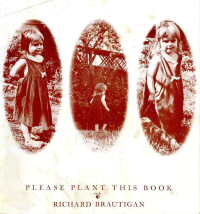
Booklet cover page. The inside of the cover was a folder with two flaps
which contained eight seed packets. Each packet presented a separate poem.
(See below for reproductions of the poem packets.)
|
California Native Flowers:
In this spring of 1968 with the last
third of the Twentieth Century
travelling like a dream toward its
end, it is the time to plant books,
to pass them into the ground, so that
flowers and vegetables may grow
from these pages.
|
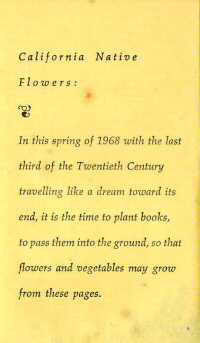 |
Calendula:
My friends worry and they tell me
about it. They talk of the work
ending, of darkness and disaster.
I always listen gently, and then
say: No, it's not going to end. This
is only the beginning, as this book
is only a beginning. |
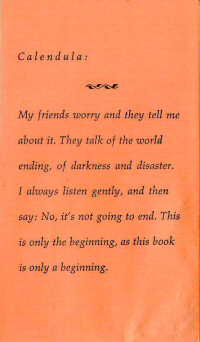 |
Sweet Alyssum Royal Carpet:
I've decided to live in a world where
books are changed into thousands
of gardens with children playing
in the gardens and learning the gen-
tle ways of green growing things. |
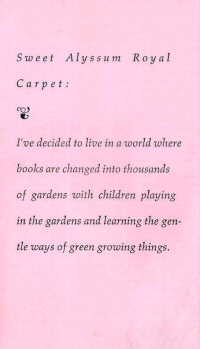 |
Shasta Daisy:
I pray that in thirty-two years
passing that flowers and vegetables
will water the Twenty-First Cen-
tury with their voices telling that
they were once a book turned by
loving hands into life. |
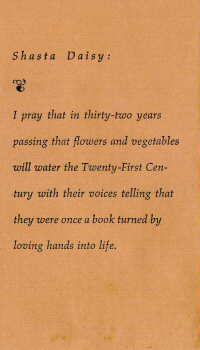 |
Parsley:
I thank the energy, the gods and the
theater of history that brought
us here to this very moment with
this book in our hands, calling
like the future down a green and
starry hall.
|
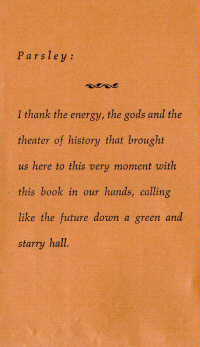 |
Lettuce:
The only hope we have is our
children and the seeds we give them
and the gardens we plant together. |
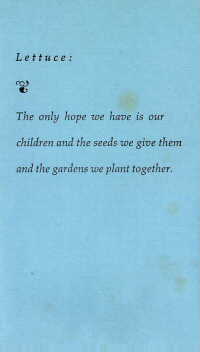 |
Squash:
The time is right to mix sentences
sentences with dirt and the sun
with punctuation and the rain with
verbs, and for worms to pass
through question marks, and the
stars to shine down on budding
nouns, and the dew to form on
paragraphs. |
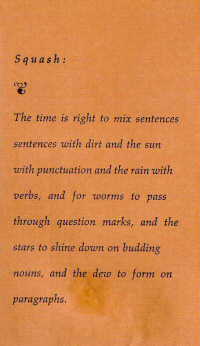 |
Carrots:
I think the spring of 1968 is a good
time to look into our blood and
see where our hearts are flowing
as these flowers and vegetables
will look into their hearts every day
and see the sun reflecting like a
great mirror their desire to live
and be beautiful. |
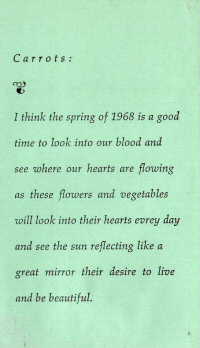 |
Back Side of Packet
California Native Flowers:
Plant seed directly in the open where plants are to
remain in well prepared soil after all danger of frost is past. In
frost-free districts seed may be planted in the fall. Mix seed with
several times its bulk of fine soil and sow broadcast, preferably in an
open sunny location. Cover any exposed seed very lightly, not over 1/8
inch and press soil down firmly. When plants are well established, thin
out to stand 6 inches apart as crowding produces inferior plants. Keep
ground moist with fine spray until plants are well up. If allowed to
remain, the plants will reseed year after year.
Packed for the 1968 - 1969 Season
|
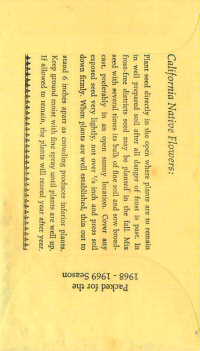
The back side of each packet contained planting instructions. Here is
one example of the eight packets.
|
Bibliographic Note:
Brautigan bibliographies (Lepper, Webber) do not mention a second issue
of Please Plant This Book. However, I have in the collection
such a second issue. If requested, I will supply all bibliographic data to
identify such a copy, along with scans of the cover and inside imprint
information. |
|
